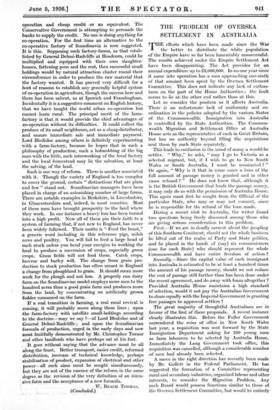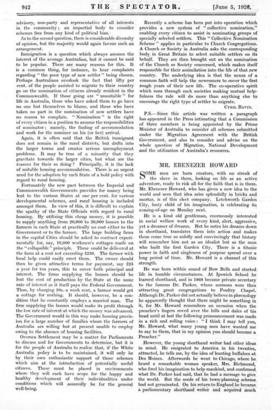THE PROBLEM OF OVERSEA SETTLEMENT IN AUSTRALIA
THE efforts which have been made since the War the better to distribute the white population of the Empire have so far been lamentably unsuccessful. The results achieved under the Empire Settlement Act have been disappointing. The Act provides for an annual expenditure up to £3,000,000. In no one year since it came into operation has a sum approaching one-sixth of that amount been spent by the Oversea Settlement Committee. This does not indicate any lack of enthus- iasm on the part of the Home Authorities ; the fault seems to lie at- the other end rather than at this.
Let us consider the position as it affects Australia. There is an unfortunate lack of uniformity and co- ordination in the policies adopted by the various States of the Commonwealth. Immigration into Australia is controlled by the State Authorities. The Common- wealth Migration and Settlement Office at Australia House acts as the representative of each in Great Britain, but has no authority beyond filling the requisitions sent them by each State separately.
This leads to confusion in the mind of many a would-be settler. " Why," he asks, " may I go to Victoria as a selected migrant, but, if I wish to go to New South Wales or South Australia, I must be nominated ? " Or again, " Why is it that in some cases a loan of the full amount of passage money is granted and in other cases refused ? " He does not know that, although it is the British Government that lends the passage money, it may only do so with the permission of Australia House. This again must first be sought from the Official of the particular State, who may or may not consent, since he is responsible for the refund of the loan made.
During a recent visit to Australia, the writer found two questions being freely discussed among those who are giving serious consideration to this problem.
First.—If we are in deadly earnest about the peopling of this Southern Continent, should not the whole business be lifted out of the realm of Party and State politics, and be placed in the hands of (say) six commissioners (one for each State) who should represent the whole Commonwealth and have entire freedom of action ?
Secondly.—Since the capital value of each immigrant into Australia is estimated to be at least a hundred times the amount of his passage money, should we not reduce the cost of passage still further than has been done under the recent agreement, and do away with loans altogether ? Provided Australia House maintains a high standard of selection, would it not pay the Australian Government to share equally with the Imperial Government in granting free passages to approved settlers ?
The great majority of thoughtful Australians are in favour of the first of these proposals. A recent instance clearly illustrates this. Before the Fuller Government surrendered the reins of office in New South Wales last year, a requisition was sent forward by the State Immigration Department asking for 250 young men as farm labourers to be selected by Australia House. Immediately the Lang Government took office, this requisition was cancelled, although a considerable number of men had already been selected.
A move in the right direction has recently been made by Mr. Gullett in the Federal Parliament. He has suggested the formation of a Committee representing rural and secondary industries, organized labour and other interests, to consider the Migration Problem. Any such Board would possess functions similar to those of the Oversea Settlement Committee, but would be entirely advisory, non-party and representative of all interests in the community ; an impartial body to consider schemes free from any kind of political bias. • As to the second question, there is considerable diversity of opinion, but the majority would again favour such ari arrangement.
Immigration is a question which always arouses the interest of the average Australian, but it cannot be said to be popular. There are many reasons for this. It is a common thing; for instance, to hear complaints regarding " the poor type of new settler " being chosen.
Perhaps Australians overlook the fact that fifty per cent. of the people assisted to migrate to their country go on the nomination of citizens already resident in the Commonwealth. If those going are " unsuitable " for life in Australia, those who have asked them to go have no one but themselves to blame, and those who have taken no part in the nomination of new settlers have no reason to complain. " Nomination " is the right of every citizen in a position to assume the responsibilitiei of nominator ; namely, the finding of accommodation and work for the nominee on his (or her) arrival.
Again, it is often said that the British immigrant does not remain in the rural districts, but drifts into the larger towns and creates serious unemployment problems. It may be true of a minority that they gravitate towards the larger cities, but what are the reasons for their so doing ? Principally, it is the lack of suitable housing accommodation. There is an urgent need for the adoption by each State of a bold policy with regard to rural housing.
Fortunately the new pact between the Imperial and Commonwealth Governments provides for money being lent to the various States at one-per cent. for various developmental schemes, and rural' housing is included amongst them. In view of this, it is difficult to explain the apathy of the State Officials with regard to rural housing. By utilizing this cheap money, it is possible to supply anything from 20,000 to 50,000 houses to the farmers in each State at practically no cost either to the Government or to the farmer. The large building firms in the capital Cities should be asked to contract experi- mentally for, say, 10,000 workmen's cottages made on the " collapsible " principle. These could be delivered at the farm at a cost not exceeding £250. The farmer with local help could easily erect them. The owner should then be given attractive terms for payment, say £25 a year for ten, years, this to eover both- principal and interest. The firms supplying the houses should be lent the cost of production by the State at the same rate of interest as it itself pays the Federal Government.
Thus, by charging 10s.• a week rent, a farmer would get a cottage for nothing. It should, however, be a con- dition that he constantly employs a married man. The firm supplying the houses would make its profit through the low rate of interest at which the money was advanced. The Government would in this way make housing provis- ion for a large number of families whom the farmers of Australia are willing but at present unable to employ owing to the absence of housing facilities.
Oversea Settlement may be a matter for Parliaments to discuss and for Governments to determine, but it is for the people of Australia to realize that, if the White Australia policy is to be maintained, it will only be by their own enthusiastic support of those schemes which aim at the introduction of potentially useful citizens.. These must be placed in environments where they will each have scope for the happy and healthy development of their individualities under conditions which will assuredly be for the general well-being. - Recently a scheme has been put into operation, which provides a new system of " collective nomination," enabling every citizen to assist in nominating groups of specially selected settlers, This " Collective• Nomination Scheme ". applies in particular to Church Congregations, A Church or Society in Australia asks the corresponding body, in Great Britain to select suitable settlers, on its behalf. They are then brought out on the nomination of the Church or Society concerned, which makes itself responsible for their assimilation into the life of that new country. The underlying idea is that the nexus of a common faith will help the newcomers to cover the first rough years of their new life. The co-operative spirit which runs through such societies making mutual help- fulness the rule will do more than anything else to encourage the right type of settler to migrate.
CYRIL BAVIN.
P.S.—Since this article was written a paragraph has appeared in the Press intimating that a Commission of three members is being appointed by the Prime Minister of Australia to consider all schemes submitted under the Migration Agreement with the British Government, and also to consider and advise on the whole question of Migration, National Development and the utilization of Australia's resources.











































 Previous page
Previous page